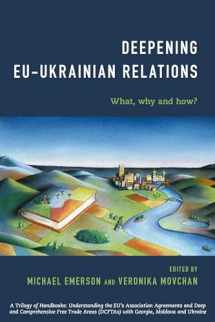
Deepening EU-Ukrainian Relations: What, Why and How?
Book details
Summary
Description
Excerpt. © Reprinted by permission. All rights reserved.
Deepening EU-Ukrainian Relations
What, why and how?
By Michael Emerson, Veronika Movchan Rowman & Littlefield International, Ltd.Copyright © 2016 Centre for European Policy Studies and Institute for Economic Research and Policy Consulting
All rights reserved.
ISBN: 978-1-78660-173-5
Contents
List of Tables, Figures and Boxes,
Abbreviations,
Preface,
Summary,
Part I. Political Principles, the Rule of Law and Foreign Policy,
1. Political principles,
2. Rule of law and movement of people,
3. Foreign and security policy,
Part II. Deep and Comprehensive Free Trade Area,
4. Market access for goods,
5. Trade remedies,
6. Customs services,
7. Technical standards for industrial goods,
8. Food safety regulations,
9. Services,
10. Public procurement,
11. Intellectual property rights,
12. Competition policy,
13. Statistics,
Part III. Economic Cooperation,
14. Macroeconomic context and financial assistance,
15. Financial services,
16. Transport,
17. Energy,
18. Environment,
19. The digital sector,
20. Consumer protection,
21. Company law,
22. Agriculture,
23. Employment and social policy,
24. Education, training and culture,
25. Science, technology and space,
26. EU agencies and programmes,
27. Cross-border cooperation,
28. Civil society,
Part IV. Legal and Institutional Provisions,
29. Dispute settlement,
30. Institutional provisions,
CHAPTER 1
Political Principles
Provisions of the Association Agreement
The Association Agreement is premised on a commitment to pursue and respect:
... the common values on which the European Union is built – namely democracy, respect for human rights and fundamental freedoms and the rule of law – [which] are essential elements of this Agreement.
The phrase "essential elements" links to Art. 478 of the Agreement, which provides that in the case of abuse of these principles the Agreement may be suspended.
Art. 6 provides for "dialogue and cooperation on domestic reform". This political dialogue is conducted through regular meetings at different levels, including at summit, ministerial and senior official levels.
On the substantive implementation of the basic principles, the jointly agreed Association Agenda of 16 March 2015 is more explicit. Priority matters for short-term action include constitutional reform, election reform, judicial reform, human rights and public administration reform. These challenges are addressed in considerable detail.
Constitutional reform. The Ukrainian government is urged to embark on a transparent process of constitutional reform that aims to develop effective checks and balances between state institutions. The functioning of local and regional governments should be strengthened, including through decentralisation, in line with the European Charter on Local Self-Government and with the delegation of substantial competences and related financial allocations.
Electoral reform. Electoral legislation should be improved and harmonised, including the laws on referenda, on the Central Electoral Commission and the financing of political parties.
Human rights and fundamental freedoms. Ukraine has committed itself to a swift implementation of the judgments of the European Court of Human Rights. Awareness-raising among the judiciary, prosecution and law enforcement bodies is given special attention. The Association Agenda outlines measures regarding freedom of expression, assembly and association. On freedom of expression, best practices should be developed in public broadcasting and media access for electoral competitors, and freedom for journalists to work without the threat of violence, protected by law enforcement agencies. There is a need for legislation in line with best European practice on the freedom of assembly, and also to strengthen the awareness of law enforcement agencies. Regarding the freedom of association, the Agenda pays particular attention to ensuring the rights of minorities; the equal treatment of men and


We would LOVE it if you could help us and other readers by reviewing the book
Book review



